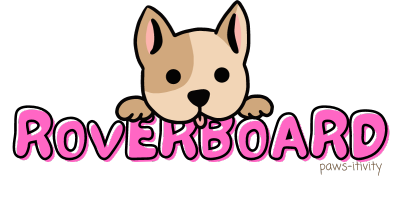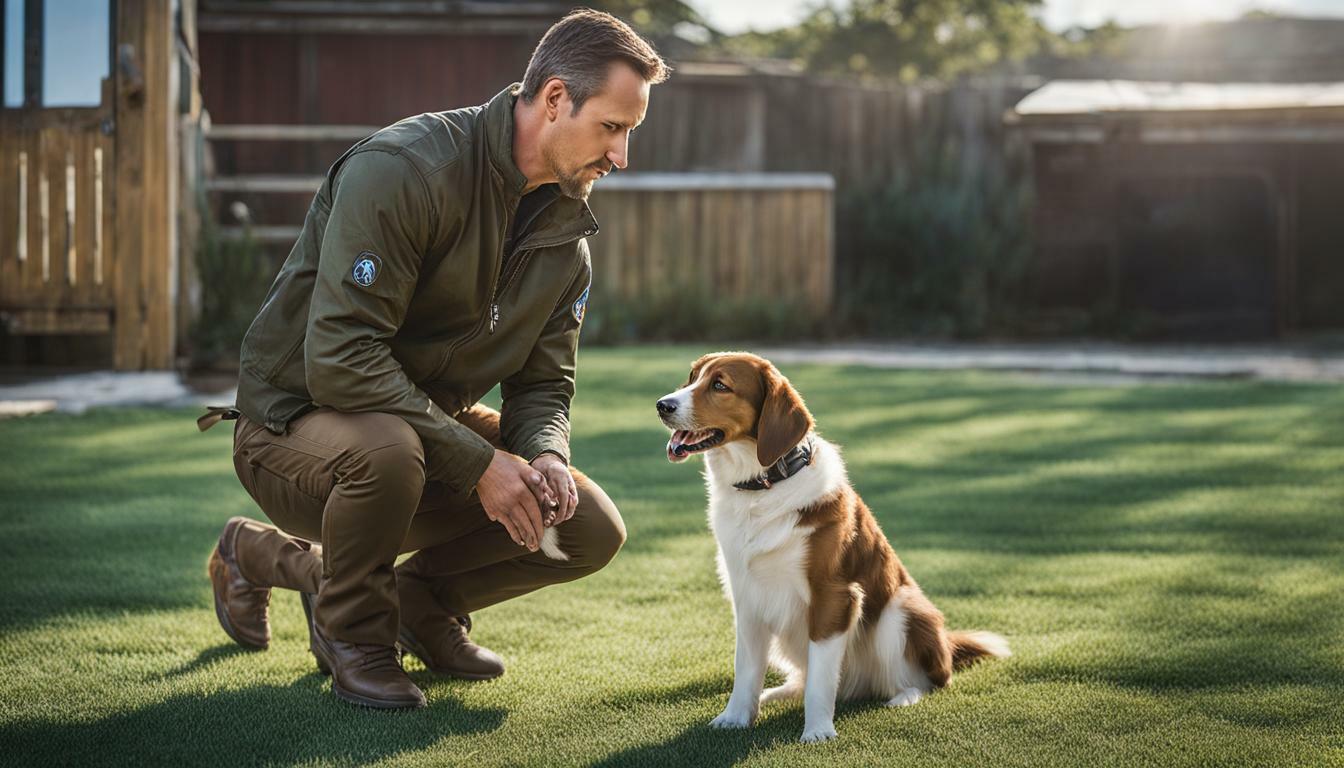Welcome to your complete Rottweiler ownership guide! As a responsible pet owner, it’s essential to understand the unique needs of your Rottweiler and provide proper care to ensure their happiness and health. This comprehensive guide will provide you with all the information you need to become a successful Rottweiler owner. From care tips to training techniques, we’ve got you covered!
- Rottweilers have specific care requirements that must be met to ensure their well-being.
- Training is crucial to preventing and addressing behavioral problems in Rottweilers.
- Rottweilers are a high-energy breed that requires regular exercise and a healthy diet.
- Grooming is an essential part of Rottweiler ownership to maintain their coat and hygiene.
- Socialization is critical to ensure a well-rounded and confident Rottweiler.
Getting Started with Rottweiler Ownership
Bringing a Rottweiler puppy home can be an exciting experience, but before you do, it’s important to be prepared. Here are some tips on how to get started:
- Rottweiler ownership guide: Read up on the breed to understand their unique characteristics and needs. This will help you provide the best care for your new pet.
- Rottweiler care tips: Gather necessary supplies, including food and water bowls, a comfortable bed, and toys. Puppy-proof your home by removing any potential hazards or dangerous items, and create a safe environment for your furry friend.
- Rottweiler ownership guide:Find a trusted veterinarian in your area and schedule your puppy’s first check-up. This is an important step in ensuring your Rottweiler stays healthy and happy.
- Rottweiler care tips: Prepare yourself for the financial responsibility of owning a Rottweiler. They are a large breed and may require more expensive food, toys, and medical care than smaller dogs.

By taking these steps, you can create a smooth transition for your Rottweiler puppy, and ensure that they feel safe and loved in their new home. Once you have prepared your home and yourself, the real fun can begin!
Understanding Rottweiler Behavior
Rottweilers are known for their loyalty, intelligence, and protective nature. However, without proper training and socialization, they can exhibit behavior problems that may become difficult to handle. In this section of our Rottweiler ownership guide, we will discuss some common behavior problems and effective techniques to address and prevent them.
Aggression
Rottweilers have a reputation for being aggressive, but it is essential to understand that this behavior is not inherent to the breed. Aggression in Rottweilers usually results from improper training or socialization, fear, or a defensive response.
Early socialization is crucial to prevent aggression from developing in Rottweilers. It involves exposing your pet to various people, pets, and environments in a positive and controlled manner to promote trust and confidence. Socialization improves your Rottweiler’s ability to deal with unfamiliar situations without becoming fearful or aggressive.
Training can also help curb aggression in Rottweilers. Consistent and positive reinforcement techniques can help promote desirable behaviors and discourage undesirable ones. If your Rottweiler exhibits aggressive behavior, it is essential to seek professional help from a certified dog trainer or behaviorist.
Separation Anxiety
Rottweilers are known for their loyalty, which often translates into separation anxiety when left alone. Separation anxiety can lead to destructive behaviors such as chewing, barking, and digging.
Training and gradual desensitization can help prevent and manage separation anxiety. It is vital to make your Rottweiler comfortable with your absence by gradually increasing the time spent away. Providing toys and leaving the radio or TV on can also help soothe your pet and alleviate anxiety.
Fear and Shyness
Rottweilers can become fearful and shy without proper socialization and exposure to different environments. Fearful Rottweilers may exhibit behavior such as cowering, trembling, or hiding.
Socialization and exposure to different situations can help prevent and manage fear and shyness in Rottweilers. Gradual exposure to new people, pets, and environments can teach your pet that there is nothing to fear.
It is crucial to address behavior problems in Rottweilers as early as possible. Seeking professional help from a certified dog trainer or behaviorist can help prevent and manage behavior problems.

Maintaining your Rottweiler’s health is crucial for a long and happy life. As a responsible owner, it is essential to keep up with regular check-ups, vaccinations, and necessary treatments. Proper nutrition, exercise, and grooming also play significant roles in your Rottweiler’s overall well-being.
Regular check-ups with your veterinarian allow for early detection and treatment of any health issues. Your Rottweiler should receive routine vaccinations to prevent diseases such as rabies, distemper, and parvovirus. Heartworm prevention medication is also essential to protect against this potentially fatal parasite.
Proper nutrition is crucial for your Rottweiler’s growth and development. A high-quality diet that meets their nutritional needs is necessary for maintaining a healthy weight, strong bones, and a shiny coat. Consult with your veterinarian to determine the best diet for your Rottweiler and ensure that portion control is adequate to prevent obesity.
Regular exercise is essential for your Rottweiler’s physical and mental health. Rottweilers are a high-energy breed that requires daily exercise to stay mentally and physically stimulated. Exercise also helps prevent obesity, joint problems, and other health issues. It’s best to tailor your exercise routine to your Rottweiler’s specific needs based on age, weight, and activity level.
Grooming your Rottweiler is essential for their hygiene and overall health. Rottweilers have a short, dense coat that requires regular brushing to remove dead hair and prevent matting. Additionally, they need regular nail trims and cleaning of their ears and teeth to prevent infections and other health issues. Consult with your veterinarian or a professional groomer to determine the best grooming practices for your Rottweiler.
Overall, proper care and attention are necessary for your Rottweiler to live a happy and healthy life. Ensure that you are following the necessary health advice outlined in this ownership guide to provide your Rottweiler with the best possible care.

Training your Rottweiler is vital to ensure a happy and well-behaved pet. Rottweilers are intelligent dogs that respond well to positive reinforcement training techniques, such as clicker training and reward-based training. Consistency is key and training should begin early to ensure success.
Start with basic obedience training, such as teaching your Rottweiler commands like “sit,” “stay,” “come,” and “heel.” Use treats or toys as rewards to reinforce good behavior. As your Rottweiler progresses, you can move on to more advanced training, such as agility and tracking.
Patience is crucial during training. Rottweilers can be stubborn at times, so it’s important to remain calm and patient to avoid frustration. Avoid using punishment-based training methods, as this can lead to negative behaviors and aggression.
Remember to also socialize your Rottweiler during training. This means exposing your pet to different environments, people, and animals to ensure a well-rounded and confident pet.
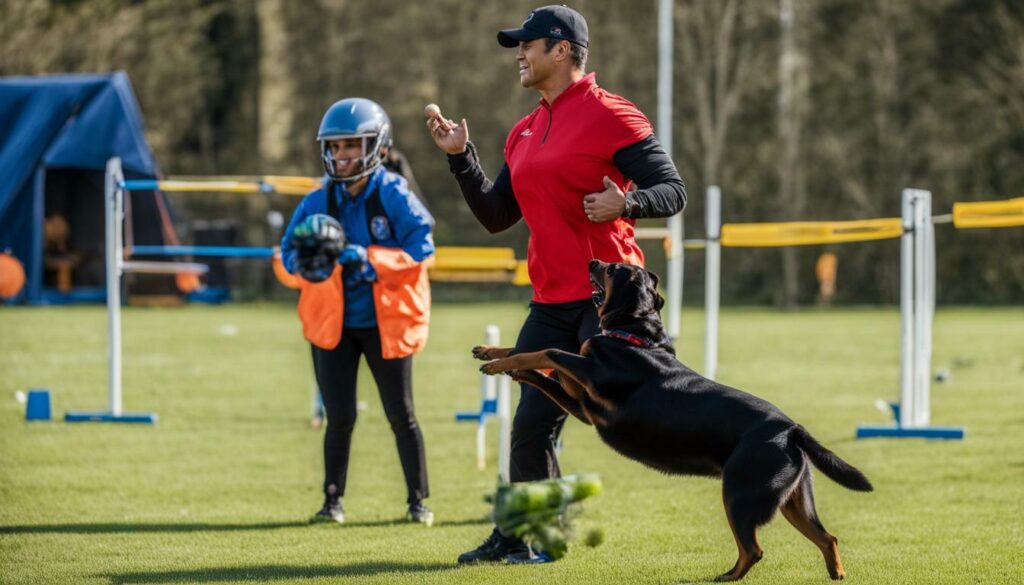
Training your Rottweiler can be a fun and rewarding experience for both you and your pet. By using positive reinforcement techniques and remaining patient and consistent, you can mold your Rottweiler into a well-behaved and obedient companion.
Rottweiler Breed Information
Rottweilers are a large and powerful breed, originally bred in Germany for herding and guarding. They are known for their muscular build, black and tan coloring, and distinctive markings. Rottweilers have a reputation for being protective and loyal, making them excellent family pets and guard dogs.
As a Rottweiler owner, it’s important to understand the breed’s characteristics. Rottweilers are intelligent and have a tendency to be dominant. They require a firm and consistent approach to training, with positive reinforcement methods. Early socialization is important for preventing aggression towards strangers and other animals.
Rottweilers have a moderate energy level and require regular exercise to prevent boredom and destructive behavior. Despite their size, Rottweilers are prone to obesity, and a balanced diet and portion control are crucial for their overall health and wellness.

Rottweilers have a short, dense coat that sheds moderately. Regular brushing and occasional baths are necessary to maintain their coat’s health and shine. Rottweilers are prone to certain health conditions, including hip and elbow dysplasia, bloat, and cancer. Regular veterinary check-ups and vaccinations can help prevent and detect health issues early.
Overall, Rottweilers are a loyal and devoted breed, well-suited for families and individuals who understand their specific needs and are committed to providing proper care and training.
Exercise Requirements for Rottweilers
Rottweilers are a high-energy breed that requires regular exercise to stay physically and mentally stimulated. Lack of exercise can result in boredom and destructive behavior, as well as obesity and health issues.
Adequate exercise for your Rottweiler includes daily walks, runs, or hikes, and interactive playtime that engages both their body and mind. Regular exercise not only improves their physical health but also their mental well-being, reducing stress and anxiety levels.
It’s important to note that while Rottweilers require exercise, it should be done with caution. Overexertion can lead to fatigue, dehydration, and injury. Especially during hot weather, make sure to provide plenty of water, avoid midday walks, and always check for signs of overheating, such as excessive panting or lethargy.
When creating an exercise routine for your Rottweiler, consider their age, weight, and overall health. Puppies require less exercise than adult dogs, while senior Rottweilers may have more limited mobility. Consult with your veterinarian to determine the appropriate exercise requirements for your Rottweiler.
Remember that providing adequate exercise is not only essential for your Rottweiler’s physical and mental health but also for your bond with them. Taking your furry companion on daily walks and engaging in playtime strengthens your relationship and creates happy memories for both of you.
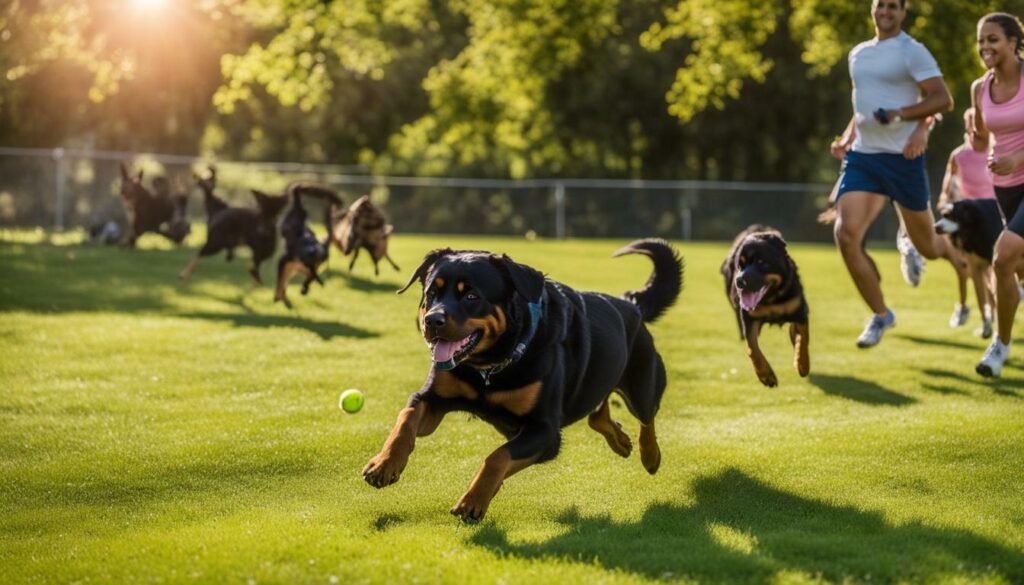
A proper diet is crucial for your Rottweiler’s overall health and well-being. As an owner, you must provide a balanced, nutritious meal plan to meet their specific dietary requirements. The ideal diet for Rottweilers should consist of high-quality proteins, complex carbohydrates, and healthy fats.
It’s recommended to feed your Rottweiler two to three meals per day, with portion sizes based on their age, weight, and activity level. Overfeeding your Rottweiler may lead to obesity, which can cause health problems such as joint pain and heart disease. Consult with your veterinarian to determine the proper portion size for your Rottweiler.

As natural carnivores, Rottweilers require a diet rich in animal proteins. Look for dog food brands that list meat as the first ingredient, such as chicken, beef, or fish. Avoid dog foods that contain fillers, artificial preservatives, or added sugars. It’s important to check the nutritional label on your dog food to ensure it meets the standards set by the Association of American Feed Control Officials (AAFCO).
In addition to dry kibble, you may supplement your Rottweiler’s diet with fresh meats, vegetables, and fruits. However, some human foods may be toxic to dogs, so it’s important to research what foods are safe for Rottweilers to eat. Consult with your veterinarian before adding any human food to your Rottweiler’s diet.
Ensuring your Rottweiler has access to fresh, clean water at all times is also crucial for their health. Dehydration can lead to serious health problems, so it’s important to monitor your Rottweiler’s water intake and refill their water bowl regularly.
By providing your Rottweiler with a well-balanced diet, you are ensuring they receive the necessary nutrients for optimal health and longevity. Consult with your veterinarian to determine the best meal plan for your furry friend.
Grooming Tips for Rottweilers
Rottweilers have a short, dense coat that requires regular grooming to keep it clean and healthy. Here are some grooming tips to help you maintain your Rottweiler’s coat:
- Brush your Rottweiler’s coat at least once a week with a rubber curry brush to remove loose hair and distribute natural oils.
- Bathe your Rottweiler once every 3-4 months or as needed. Use a dog-specific shampoo and conditioner to prevent skin irritation.
- Trim your Rottweiler’s nails every 4-6 weeks to prevent overgrowth, discomfort, and potential injury.
- Clean your Rottweiler’s ears regularly with a dog-specific ear cleaner and cotton balls to prevent infection and buildup.
- Brush your Rottweiler’s teeth every day with a dog-specific toothbrush and toothpaste to prevent dental problems.
- Check your Rottweiler’s eyes regularly for signs of infection or irritation, and clean them with a damp cloth as necessary.
Keeping up with your Rottweiler’s grooming needs not only promotes their physical health but also strengthens the bond between you and your pet.
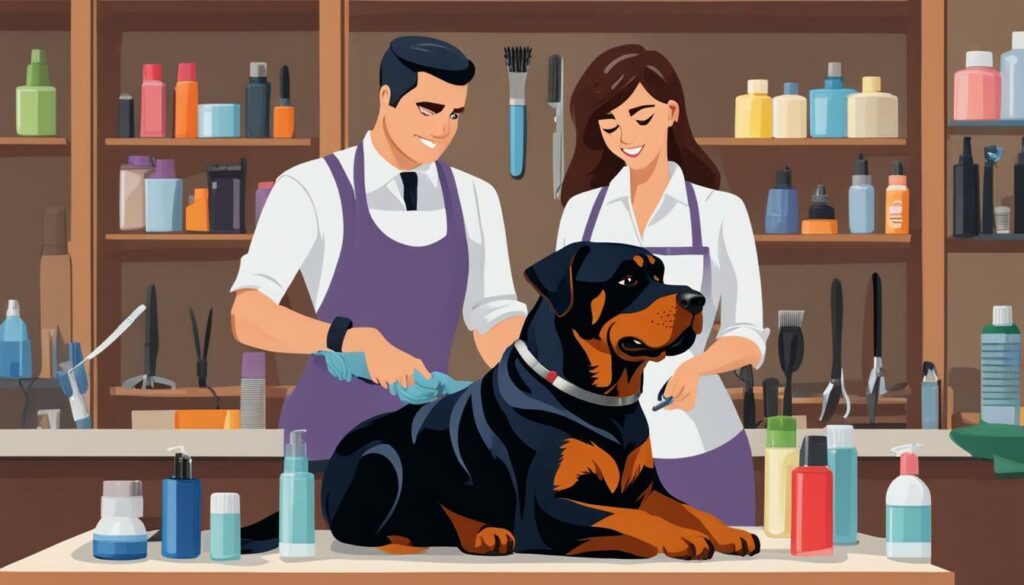
Rottweilers are social animals that require exposure to various environments and stimuli to develop proper behavior and interact well with other animals and humans. Socialization is a crucial aspect of Rottweiler training that should begin early in their lives.
To socialize your Rottweiler effectively, you must expose them to a wide range of people, animals, sounds, and experiences. Encouraging positive interactions with other pets and humans is essential for helping your Rottweiler learn appropriate behavior and avoid aggression.
When socializing your Rottweiler, it is important to remain calm and confident in your own demeanor. Dogs can sense fear and anxiety and may respond aggressively if they perceive a threat. Use positive reinforcement techniques, such as treats and praise, to encourage good behavior and establish a strong bond with your pet.
One effective method for socializing Rottweilers is to enroll them in puppy classes. These classes provide opportunities for your puppy to interact with other dogs in a controlled environment and learn essential socialization skills.
Remember that socialization is an ongoing process that should continue throughout your Rottweiler’s life. Regular exposure to new environments and experiences will help your pet remain confident, well-behaved, and happy.

By implementing the right training techniques, you can ensure that your Rottweiler becomes a well-adjusted and social animal that is a joy to be around. Use this Rottweiler ownership guide as a resource to help you raise a happy and healthy pet that will bring you years of joy and companionship.
Common Challenges of Rottweiler Ownership
Owning a Rottweiler comes with its unique set of challenges. Being aware of these challenges can help you become a better owner to your furry friend and create a harmonious home environment for all.
Aggression
One of the most common behavior problems in Rottweilers is aggression, which can manifest as biting, growling, or lunging. It’s essential to seek professional help if your Rottweiler exhibits aggressive behavior to prevent any serious harm.
Fear and Anxiety
Rottweilers may develop fear or anxiety due to past traumatic experiences, lack of socialization, or separation anxiety. It’s crucial to provide support and a safe environment for your Rottweiler to overcome their fears and anxieties.
Joint Issues
Rottweilers are prone to joint issues such as hip dysplasia and arthritis, which can cause discomfort and limit their mobility. Regular exercise and visits to the vet can help prevent and manage these problems.
Excessive Barking
Rottweilers may bark excessively due to boredom, lack of exercise, or anxiety. It’s essential to provide mental and physical stimulation and address any underlying anxiety issues to minimize excessive barking.
Stubbornness
Rottweilers can be stubborn and independent-minded, which can make training challenging. Consistency, positive reinforcement, and patience are key to training a Rottweiler effectively.
By understanding these common challenges of Rottweiler ownership, you can provide the necessary care and attention to ensure your furry friend lives a happy and healthy life.
FAQ
Q: What will I learn from this Rottweiler ownership guide?
A: In this comprehensive guide, you will discover everything you need to know to raise a happy and healthy Rottweiler. From care tips and training techniques to understanding behavior problems and providing the best health advice, explore the world of Rottweiler ownership to ensure a positive experience for both you and your furry companion.
Q: How should I prepare for bringing a Rottweiler puppy home?
A: Before bringing a Rottweiler puppy home, it’s important to be prepared. Learn about the necessary supplies, puppy proofing your home, and creating a safe and comfortable environment for your new four-legged family member.
Q: What are some common behavior problems in Rottweilers?
A: Rottweilers have distinct behavioral traits that require understanding and training. Discover common behavior problems, such as aggression and separation anxiety, and learn effective techniques to address and prevent them.
Q: How can I ensure my Rottweiler’s health and wellness?
A: Maintaining your Rottweiler’s health is crucial for a long and happy life. Explore the best practices for vaccinations, regular check-ups, nutrition, exercise, and grooming to ensure your Rottweiler stays in optimal condition.
Q: What are effective training techniques for Rottweilers?
A: Rottweilers are intelligent and trainable, but they require consistent and positive reinforcement methods. Discover effective training techniques that will help mold your Rottweiler into a well-behaved and obedient companion.
Q: Where can I find information about the Rottweiler breed?
A: Learn about the history, characteristics, and temperament of the Rottweiler breed. Understanding their origins and traits will assist you in providing suitable care and training tailored to their specific needs.
Q: How much exercise do Rottweilers need?
A: Rottweilers are a high-energy breed that requires regular exercise to stay physically and mentally stimulated. Discover the ideal exercise routines and activities to keep your Rottweiler healthy, happy, and well-behaved.
Q: What should I feed my Rottweiler?
A: Nutrition plays a crucial role in your Rottweiler’s overall well-being. Explore the dietary requirements, portion control, and recommended food choices to ensure your Rottweiler receives the necessary nutrients for optimal health.
Q: How do I groom my Rottweiler?
A: Rottweilers have a short, dense coat that requires regular grooming to keep it clean and healthy. Learn the best grooming practices and techniques to maintain your Rottweiler’s coat, nails, and overall hygiene.
Q: How can I socialize my Rottweiler?
A: Socialization is essential for Rottweilers to develop proper behavior and interact well with other animals and humans. Discover tips and techniques to expose your Rottweiler to various environments and stimuli, ensuring a well-rounded and confident pet.
Q: What are some common challenges of Rottweiler ownership?
A: Despite their many positive traits, Rottweilers can face certain challenges. From health issues to behavioral quirks, learn how to identify and overcome common obstacles that may arise during your journey as a Rottweiler owner.
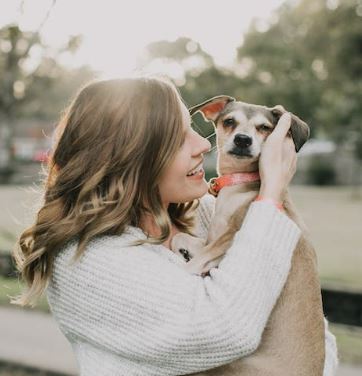
Marissa Delotta, 36, from Dayton, Ohio, is the creative force behind Roverboard.com, a beloved online destination for dog lovers. As a dedicated mom and canine enthusiast, Marissa combines her family experiences with her love for dogs to offer a platform where dog owners can exchange tips, heartwarming stories, and advice. Her website has become a vibrant community for sharing the joys of dog parenting. In her free time, Marissa enjoys exploring dog parks with her family and volunteering at local animal shelters.
